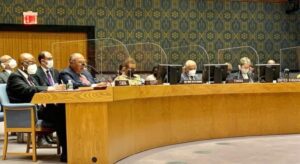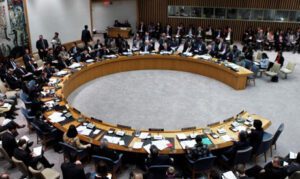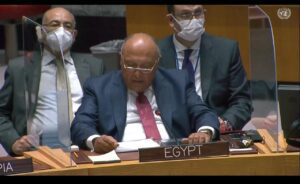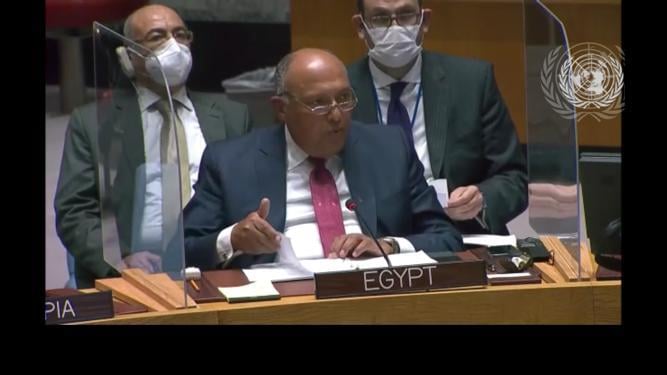Egypt’s foreign minister said on Thursday that the Grand Ethiopian Renaissance Dam (GERD) is a threat to the life of Egyptians.
“Egypt, a nation of a 100 million-plus population, is facing an existential threat posed by the construction of a giant entity on the artery that gives it life,” Sameh Shoukry told a UN Security Council session.

“This building has risen with a massive wall made of iron and steel between the two banks of an old and great river, overshadowing the future and destiny of the Egyptian people,” the top diplomat said.
“With every added new stone to its structure, the Ethiopian renaissance dam is rising and its reservoir is widening, which is narrowing a life artery for millions of innocents who live far beyond this dam on the River Nile,” he added.
The foreign minister said Egypt has resorted to the UN Security Council on June 29, 2020 to warn the international community against this imminent danger in the offing.
Egypt on 29 June, 2020 resorted to the Security Council, cautioning of the near occurrence of the first filling of the Ethiopian dam, and warning against the repercussions of pursuing to impose dominance on the Nile River which “our survival depends on,” the top diplomat told the Security Council.
“We appealed to the Security Council to work, with all effort and perseverance, to avoid the escalation of tension that threatens peace in a fragile region … and we called on our brothers to shoulder responsibility and to recognize that the future of the wealth of our peoples are intertwined,” Shoukry added.
Several days after the Security Council’s session last year, Ethiopia initiated the filling of the dam unilaterally, and its foreign minister arrogantly declared “the river became a lake… the Nile is ours”, Shoukry said.
“Egypt’s response towards this aggression was characterized by self-restraint and following the paths of peace and security to reach a settlement to this crisis through a fair agreement that preserves the rights of the three parties,” the foreign minister added.

“Egypt has sincerely adopted an initiative by the African Union to restart the negotiations under its auspices, and Egypt has engaged – over a year- in the talks held by the union and ran by our African brothers to reach an African solution to this critical crisis,” he said.
However, these negotiations failed, and after a year of fruitless talks, we “find ourselves in the face of the unilateral Ethiopian behavior without an agreement that guarantees the protection of the downstream countries from its dangers.”
“This [unilateral action] is obvious in Ethiopia’s declaration on July 5, 2021 of the beginning of the second filling of the dam unilaterally and without an agreement,” he added.
“This impertinent behavior does not only reflect the lack of responsibility from the Ethiopian side, and the indifference towards the harm caused by the filling of this dam to Egypt and Sudan, but also Ethiopia’s ill-intention and favoring to impose a fait accompli on the downstream countries in a blatant challenge to the collaborative will of the international community,” the minister said.
Ethiopia’s approach and its continuous unilateral acts show its ignorance and disdain for the rules of international law as it does not pay attention to the Security Council, Shoukry said.
“Ethiopia’s unilateral acts reveal its real policies that aim to capture the Nile River and to turn it from a trans-boundary river into a political instrument to exercise political influence and impose dominance, which risks to undermine international peace and security in the region,” the top diplomat said.
Therefore, Egypt has chosen anew to re-introduce the issue to the Security Council due to the continuous unilateral moves by Ethiopia and the repeated failure of the negotiations amid the absence of any effective and serious path in this turn to achieve a political settlement to this vital issue, he added.

“Egypt has come to the Security Council out of its strong belief in international law, its established conviction of the importance and effectiveness of the multilateral action as an instrument to boost peace and prevent conflicts and disputes, and its commitment to principles founded by the UN Charter,” Shoukry added.
The foreign minister expressed his full trust in the council’s ability to shoulder its responsibility in maintaining international peace and security through taking necessary measures to address the dam crisis.
Egypt has engaged in a whole decade of negotiations on the GERD, the foreign minister said.
“Since Ethiopia unilaterally commenced the construction of this dam – without fulfilling the duties incumbent upon it as an upstream state to notify and consult its downstream co-riparians – Egypt has sought to reach an agreement on the GERD that would preserve the rights of the three countries and promote their common interests,” he added.
“Our hope was – and remains – to conclude a legally binding agreement that enables Ethiopia to achieve its developmental objectives by generating hydropower from the GERD expeditiously, efficiently, and sustainably,” Shoukry said.
This reflects the fact that Egypt was – and remains – committed to Ethiopia’s stability and prosperity and it also exemplifies Egypt’s longstanding policy of engendering and expanding cooperation with our co-riparians throughout the Nile Basin, he noted
“However, any agreement on the GERD must be equitable, reasonable, and legally binding,” the foreign minister said.
It must include provisions to mitigate the adverse effects of this dam, especially during periods of drought …… it must prevent the infliction of significant harm on the riparian interests of Egypt and Sudan …… it must guarantee the safety, functionality, and resilience of downstream dams …… and it must ensure that Egypt’s water security is not imperiled by the filling and operation of what will become Africa’s largest hydropower facility,” he said.
Realizing this objective of concluding a fair and balanced agreement on the GERD is not unsurmountable nor is it beyond reach, the foreign minister said.
“Indeed, the continued failure of negotiations is not due to a lack of scientific solutions to the outstanding technical issues, nor is it because we lack the requisite legal expertise to draft an agreement.
“Rather, the singular source of our failure has been – and remains – Ethiopian intransigence,” he added.
This reality is best reflected in the following statement from the letter addressed by Minister of Foreign Affairs of Ethiopia to the Security Council on June 23, 2021 ……

“Filling and operating the GERD without seeking agreement from Egypt and Sudan is the bare minimum of the exercise of this sovereign prerogative as a riparian country of an international watercourse”.
“The sentiment in this statement, is the root of the problem,” the top diplomat said.
“It demonstrates that the cause of this crisis is political. It reveals that Ethiopia is operating under the assumption that it is engaging in negotiations on the GERD out of comity or charity,” he added.
Ethiopia has conveniently decided to ignore the realities of geography and appears to be under the illusion that the Blue Nile is an internal river that it can exploit to its exclusive benefit, he said.
Ethiopia refuses to sign a legally binding agreement …… It has even objected to calling the instrument being negotiated an “agreement” and has proposed to designate the text as merely “guidelines and rules”.
Ethiopia also refuses to include any form of binding dispute resolution provisions …… and insists on codifying an unlimited right to alter and amend the GERD agreement whenever it so desires, he added.
Ethiopia has sought to justify these unreasonable positions by invoking some mythical injustice that had been wrought upon it by so-called colonial treaties or by an unfair status quo, the foreign minister said.
“Ethiopia was never a colony, and has never concluded a treaty relating to the Nile under the threat of coercion or compulsion …… Moreover, Egypt has never objected to Ethiopia’s right to harness the resources of the Blue Nile,” he said.
“However, Egypt expects, and indeed demands, that its upstream co-riparian complies with its international legal obligations, which require it to prevent the infliction of significant harm against the interests of its downstream neighbors.,” Shoukry told the Security Council.
The Sudanese top diplomat said the GERD is a mega African project that could be a model of fruitful cooperation for more than a quarter billion of African citizens.
She underlined the importance of clinching a legal agreement on such project in a way that could provide protection for human safety in Egypt and Sudan.
Building a giant dam with a capacity of 74 billion cubic meters and close to the Sudanese borders could pose a direct threat to the communities there and their safety, she added.
She also underscored the dangers of Ethiopia’s first filling of the dam in 2020 with 5 billion cubic meters of water, leading to a reduction in the Blue Nile rates which caused a halt of three water stations in Khartoum.
The minister also warned against the dire political and economic consequences of such filling process without an agreement.
In the absence of an agreement that regulates its filling and operation, the GERD can cause cumulative water shortages in Egypt amounting to 120 billion cubic meters, it will diminish access to clean drinking water, it could deprive millions of farmers of the water they use to irrigate their fields, it will rob countless families of their income and livelihood, it will destroy thousands of acres of arable land, it will increase desertification and degrade the riparian eco-system, and it will increase vulnerability to the effects of climate change, the foreign minister said.
This is a situation that Egypt cannot, and will not, tolerate. It is, therefore, imperative for the international community to exert every effort …… including by acting through the Security Council …… to preempt this eventuality and prevent the GERD from becoming a threat to the very existence of Egypt, he noted.
“This requires the Council to unequivocally call upon the parties to reach an equitable agreement on the GERD, within a defined timeline, and to encourage them to work diligently and with earnestness to achieve that objective forthwith,” Shoukry said.
Otherwise, if its riparian rights are jeopardized or if its survival is imperiled, Egypt will be left with no alternative but to uphold and protect its inherent right to life that is guaranteed by the laws and customs of nations and the imperatives of nature, he added.
“We come here in search for a viable path towards a peaceful, amicable, and negotiated solution to this crisis …… and to avert the dire consequences of our inability to reach a settlement to this matter,” he further said.
“Our hope is that the Security Council will recognize the gravity of the situation and fulfill its responsibility to maintain international peace and security,” he said.
“Our expectation is that this Council will take the necessary measures to ensure that the parties engage in an effective process of negotiations that could yield an agreement that serves our collective interests, Shoukry added.
“As evident from the text of this draft resolution, we do not expect the Council to formulate solutions to the outstanding legal and technical issues …… nor did we request that the Council impose the terms of a settlement of a riparian dispute on the parties.
Rather, this resolution is political in nature …… and its purpose, which we believe is eminently balanced and constructive …… is to relaunch negotiations according to an augmented format that retains and enhances the leadership of the Chairperson of the African Union and that enables our international partners, including the United Nations, to use their expertise in this area to aid our three countries in their quest to conclude, within a reasonable timeframe, an equitable agreement on the GERD, he said.
Indeed – if anything – this resolution aims at implementing and effectuating the outcomes of the two meetings of the Bureau of the African Union Assembly that were held on this matter …… which instructed the parties to expeditiously finalize, with the assistance of our partners attending these talks as observers, the text of a legally binding agreement on the filling and operation of the GERD, and called upon them not to take unilateral measures that could jeopardize this process, he added.
Adopting this resolution would reaffirm the Security Council’s resolve to upholding its responsibility to maintain international peace and security … and would send an unequivocal signal of reassurance that it remains committed to the peace and prosperity of our African continent, while failure to take effective action on the question of the GERD would be a disheartening dereliction of duties.
Egypt will exert every effort to reach an agreement on the GERD that upholds the unbreakable bond of brotherhood between our countries and that reflects the timeless kinship among the peoples living along the banks of the Nile River, he said






Discussion about this post